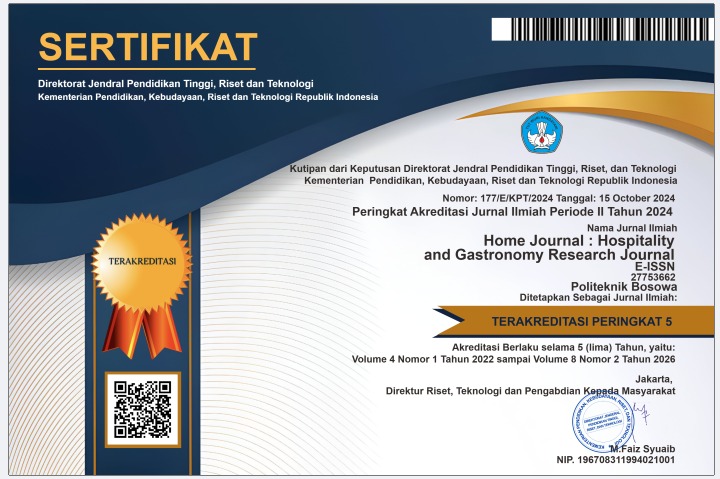- Focus and Scope
- Section Policies
- Peer Review Process
- Publication Frequency
- Open Access Policy
- Publication Ethics
- Plagiarism Policy
- Article Processing Charge
Focus and Scope
Home Journal : Hospitality and Gastronomy Research Journal is published two times a year in January and July containing articles result of thought and researches in Hospitality and Gastronomy. This journal encompasses original research articles, review articles, and short communications, including:
- Sustainable Tourism Development
- Community-based Tourism
- Nature-based Tourism
- Creative Tourism
- Social Media for Tourism Marketing
- Smart Tourism
- Gastronomy
- Herbs, Spices, and Traditional Food
- Cultural Food Studies
- Food Product and Pastry
- Food Packaging and Product Development
- Branding and Marketing
- Education and Training
- Regulation and Policy
Section Policies
Artikel
Peer Review Process
Home Journal : Hospitality and Gastronomy Research Journal is an national journal published by Politeknik Bosowa. The research article submitted to this online journal will be blind peer-reviewed by at least 2 (two) reviewers. The accepted research articles will be available online following the journal peer-reviewing process. Language used in this journal is Indonesian.
Review Process:
- Editor will recieve manuscript from author;
- Editor will evaluate manuscript (journal aim and scope, in house style, supplementary data); (Rejected if not meets criteria)
- Editor will do screening for plagiarism on offline and online database manually; (Rejected if found major plagiarism, contacted author if found redunancy or minor plagiarism for clarification)
- Editor will send manuscript to reviewer along with review form (blind review);
- Reviewer will send back his review form to Editor (with revised manuscript if necessary);
- Editor decision (rejected, requires major revision, needs minor revision, or accepted);
- Confirmation to the Author.
- If any revision, author will revise manuscripts and should be returned to the editor without delay. Returned later than three months will be considered as new submissions.
Publication Frequency
Home Journal : Hospitality and Gastronomy Research Journal is scheduled for publication twice a year in January and Juni
Open Access Policy
This journal provides immediate open access to its content on the principle that making research freely available to the public supports a greater global exchange of knowledge.
Publication Ethics
HOME Journal is a peer-reviewed journal published by Hospitality Study Program of Politeknik Bosowa. The journal is committed to upholding the highest standards of publication ethics and takes all possible measures against any publication malpractices. All authors submitting their works to the journal for publication as original articles attest that the submitted works represent their authors’ contributions and have not been copied or plagiarized in whole or in part from other works. This statement is based on Elsevier's Policies and Ethics and COPE Best Practice Guidelines for Journal Editors.
Ethical Guideline for Journal Publication. The publication of an article in a peer-reviewed HOME Journal is an essential building block in the development of a coherent and respected network of knowledge. It is a direct reflection of the quality of the work of the authors and the institutions that support them. Peer-reviewed articles support and embody the scientific method. It is therefore important to agree upon standards of expected ethical behavior for all parties involved in the act of publishing: the author, the journal editor, the peer reviewer, the publisher, and the society.
Hospitality Study Program of Politeknik Bosowa as the publisher of HOME Journal takes its duties of guardianship over all stages of publishing seriously and we recognize our ethical behavior and other responsibilities.
Duties of Authors
- Reporting Standards: Authors of reports or original research should present an accurate account of the work performed as well as an objective discussion of its significance. Underlying data should be represented accurately in the paper. A paper should contain sufficient detail and references to permit others to replicate the work. Fraudulent or knowingly inaccurate statements constitute unethical behaviour and are unacceptable.
- Data Access and Retention: Authors are asked to provide the raw data in connection with a paper for editorial review, and should be prepared to provide public access to such data (consistent with the ALPSP-STM Statement on Data and Databases), if practicable, and should, in any event, be prepared to retain such data for a reasonable time after publication.
- Originality and Plagiarism: The authors should ensure that they have written entirely original works. If the authors have used the work and/or words of others then it has to be appropriately cited or quoted. Plagiarism takes many forms, from 'passing off' another's paper as the author's own paper, to copying or paraphrasing substantial parts of another's paper (without attribution), and/or to claiming results from research conducted by others. Plagiarism in all its forms constitutes unethical publishing behaviour and is unacceptable.
- Multiple, Redundant or Concurrent Publication: An author should not, in general, publish manuscripts describing essentially the same research in more than one journal or primary publication. Submitting the same manuscript to more than one journal concurrently constitutes unethical publishing behaviour and is unacceptable.
- Acknowledgement of Sources: Proper acknowledgment of the work of others must always be given. Authors should cite publications that have been influential in determining the nature of the reported work.
- Authorship of the Paper: Authorship should be limited to those who have made a significant contribution to the conception, design, execution, or interpretation of the reported study. All those who have made significant contributions should be listed as co-authors. Where there are others who have participated in certain substantive aspects of the research project, they should be acknowledged or listed as contributors. The corresponding author should ensure that all appropriate co-authors and no inappropriate co-authors are included on the paper and that all co-authors have seen and approved the final version of the paper and have agreed to its submission for publication.
- Disclosure and Conflicts of Interest: All authors should disclose in their manuscript any financial or other substantive conflicts of interest that might be construed to influence the results or interpretation of their manuscript. All sources of financial support for the project should be disclosed.
- Fundamental Errors in Published Works: When an author discovers a significant error or inaccuracy in his/her own published work, it is the author’s obligation to promptly notify the journal editor or publisher and cooperate with the editor to retract or correct the paper.
- Hazards and Human or Animal Subjects: If the work involves chemicals, procedures or equipment that have any unusual hazards inherent in their use, the author must clearly identify these in the manuscript.
Duties of Editors
- Fair Play: An editor at any time evaluates manuscripts for their intellectual content without regard to race, gender, sexual orientation, religious belief, ethnic origin, citizenship, or political philosophy of the authors.
- Confidentiality: The editor and any editorial staff must not disclose any information about a submitted manuscript to anyone other than the corresponding author, reviewers, potential reviewers, other editorial advisers, and the publisher, as appropriate.
- Disclosure and Conflicts of Interest: Unpublished materials disclosed in a submitted manuscript must not be used in an editor's own research without the express written consent of the author.
- Publication Decisions: The editor board journal are responsible for deciding which of the articles submitted to the journal should be published. The validation of the work in question and its importance to researchers and readers must always drive such decisions. The editors may be guided by the policies of the journal's editorial board and constrained by such legal requirements as shall then be in force regarding libel, copyright infringement, and plagiarism. The editors may confer with other editors or reviewers in making this decision.
- Review of Manuscripts: The editor must ensure that each manuscript is initially evaluated by the editor for originality. The editor should organize and use peer review fairly and wisely. Editors should explain their peer review processes in the information for authors and also indicate which parts of the journal are peer-reviewed. The editor should use appropriate peer reviewers for papers that are considered for publication by selecting people with sufficient expertise and avoiding those with conflicts of interest.
Duties of Reviewers
- Contribution to Editorial Decisions: Peer review assists the editor in making editorial decisions and through the editorial communications with the author may also assist the author in improving the paper.
- Promptness: Any selected referee who feels unqualified to review the research reported in a manuscript or knows that its prompt review will be impossible should notify the editor and excuse himself from the review process.
- Standards of Objectivity: Reviews should be conducted objectively. Personal criticism of the author is inappropriate. Referees should express their views clearly with supporting arguments.
- Confidentiality: Any manuscripts received for review must be treated as confidential documents. They must not be shown to or discussed with others except as authorized by the editor.
- Disclosure and Conflict of Interest: Privileged information or ideas obtained through peer review must be kept confidential and not used for personal advantage. Reviewers should not consider manuscripts in which they have conflicts of interest resulting from competitive, collaborative, or other relationships or connections with any of the authors, companies, or institutions connected to the papers.
- Acknowledgement of Sources: Reviewers should identify relevant published work that has not been cited by the authors. Any statement that an observation, derivation, or argument had been previously reported should be accompanied by the relevant citation. A reviewer should also call to the editor's attention any substantial similarity or overlap between the manuscript under consideration and any other published paper of which they have personal knowledge.
Plagiarism Policy
- Plagiarism and self-plagiarism are not allowed;
- The authors should ensure that they have written entirely original works, and if the authors have used the work and/or words of others that this has been appropriately cited or quoted;
- An author should not in general publish manuscripts describing essentially the same research in more than one journal or primary publication. Submitting the same manuscript to more than one journal concurrently constitutes unethical publishing behavior and is unacceptable;
- Proper acknowledgment of the work of others must always be given. Authors should cite publications that have been influential in determining the nature of the reported work.
Working Process:
- Editorial Team checking manuscript on offline and online database manually (checking proper citation and quotation);
- Editorial Team checking manuscript by using Turnitin app. If it is found plagiarism indication (more than 25%), the board will reject the manuscript immediately.
Article Processing Charge
This journal charges the following author fees.
Article Submission charges Free IDR 0.0
Article Processing and Publication charges (APCs) IDR 350.000
This journal charge the article publication fee for supporting the cost of wide open access dissemination of research results, managing the various costs associated with handling and editing of the submitted manuscripts, and the Journal management and publication in general, the authors or the author's institution is requested to pay a publication fee for each article accepted. The fee covers :
- DOI registration for each paper
- Layout Editing according to template and journal standard
- Reviewing and Proofreading










